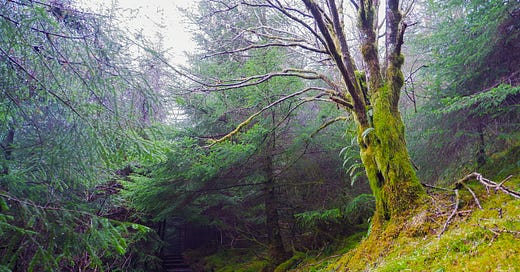For my very first Substack post, I thought I would dive into one of the hottest–and most wildly misunderstood–topics in the travel industry: ecotourism.
If you’re anything like me, ecotourism is one of those concepts that you kind of understand in theory, but also not enough to actually give a solid definition. Of course, from context you might guess it has something to do with the environment, or this whole ‘going green’ thing. Maybe it just refers to traveling sustainably. But then again, what does that really mean? Is it taking shorter flights, or showering less while on vacation? Reusing my hotel pool towel? I brought a reusable water bottle on my last trip to Thailand, does that count as ecotourism? Or maybe it’s just tourism that has to do with ecology, like forests and stuff…I visited a tropical rainforest in Costa Rica last year, that means I’m an ecotourist, right?
Okay now I’m stumped. What on earth is ecotourism and why should I care?
That’s the thing: no one knows.
Okay, now that might be a bit of a stretch. Sure, there are plenty of people out there who believe they know the ins and outs of ecotourism. They all just can’t seem to agree on exactly what that is.
Currently, we do not have a widely-accepted definition of ecotourism. Worse yet, everyone seems to have a different opinion of what should be covered by the term, making the word mean both everything and nothing at the same time.
Some definitions call it a ‘responsible’ way of traveling while others describe it as traveling to a particular environment or natural area as a way to promote conservation. Some people claim it’s about education, while others say it’s about sustainability and carbon emissions. It’s a term that has been plastered on hotels, billboards, and airline Net-Zero campaigns all over the globe. It has gained so much traction that the global ecotourism business was valued at a whopping 260.76 billion USD in 2024.
And as you can imagine, having all of these very vague ideas of what ecotourism is makes it really hard for people to come to a consensus on what the purpose of the concept, let alone access any of its supposed impacts.
Worst yet, these loose interpretations have given companies all but free range to use ecotourism as a way to promote just about anything related to tourism and the environment, regardless if it has any positive impact. More often than we’d care to admit, the phrase ‘ecotourism’ has been used as a marketing tool rather than a force for change.
That's right, ecotourism has fallen victim to one of the climate movement’s biggest enemies: greenwashing.
But how did we get here? Why has ecotourism been hailed as the savior for all of our travel-related problems and yet we still can’t collectively decide what the term really means? Plus, how can we even begin to determine who is misusing the term when we haven’t properly defined what it is?
In order to begin to understand all of its chaos and complexities, we first need to look back at where ecotourism got its start.
The Origins of Ecotourism:
Ecotourism emerged as a concept in the 1980’s as a creative way to promote conservation in natural areas. During this time, people were concerned about the longevity of many fragile ecosystems against forces like development, overcrowding, and degradation.
The concept of “ecotourism” was created as a way to promote conservation of natural areas: by enticing visitors to pay good money to see fragile ecosystems, they could give economic incentive for the local community to conserve an environment.
In 1982 we got our first definition of ecotourism in the Oxford English Dictionary. It defines ecotourism as “ecotourism is tourism to areas of ecological interest (typically exotic and often threatened natural environments), especially to support conservation efforts and observe wildlife.”
Based on this definition, we can see that (at least in the beginning) ecotourism didn’t have anything to do with carbon or sustainability. It was simply an economic incentive for conservation.
Soon after this definition was created, however, people began seeing the potential for ecotourism to protect against other ugly aspects of travel, like over tourism and the destruction of local communities.
While today we hear stories of tourism destroying Venice, or anti-visitors demonstrations spraying tourists with water guns in Barcelona, the dangers of over tourism were already understood over thirty years ago. In the 1990’s, as more people understood the effects of over tourism, researchers began to better acknowledge the impacts that tourism was having on communities and society.
Ecotourism soon became the apparent antithesis to over tourism and was used to address many social and economic issues related to the tourism industry. Suddenly, ecotourism was environmental tourism with an education aspect, a sustainability and emissions clause, and a social development mission. Some interpretations of ecotourism went so far as to claim that “ecotourism aims to reverse the exploitative relationships between tourists and locals.”
That is not to say that ecotourism can’t do all of these amazing things. It just wasn’t its original intention.
As time went on and we starting tacking more objectives onto the ecotourism movement, the definition of ecotourism became more and more muddled. As we lost clarity on the scope of this concept, certain actors began to take advantage of the mess.
Onto the Greenwashing…
While the interpretations of ecotourism grew and grew, so did its popularity. The ecotourism business is likely to skyrocket to a market value of $299 billion by 2026. With the recent boom in the number of climate-conscious travelers, its no wonder that environment-forward travel experiences are incredibly sought-after.
Unfortunately, many of the projects and hotels that take part in this lucrative business just do not meet the criteria of ecotourism. By simply putting the word “eco” or “sustainable” in their marketing campaigns, they are effectively misleading consumers to believe that they promote ecotourism while not having the proper track record to back it up.
A 2010 study of the Galapagos Islands found that many of the accommodations using the name of “eco lodge” or “eco hotel” actually had little to no actual sustainable action plans or conservation criteria. Especially when attempting to appeal to a client demographic specifically attracted to the Galapagos’ ecological significance, these companies exploited the ambiguity of the phrase ‘ecotourism’ for profit.
This study–as well as many similar ones from around the world–highlight the danger of relying on such ambiguous terms to determine our purchasing decisions.
Ecotourism is an immensely profitable business, and with more travelers than ever making climate a consideration when they travel, it’s more important than ever that we have the knowledge to gage whether these terms are being exploited.
What we can learn from Ecotourism
Even though we can acknowledge that the concept of ecotourism is flawed, there are still some great aspects that we can incorporate into our visions for future travel.
While the definitions and aims of ecotourism vary wildly depending on the sources you listen to, one of them stands out as a more robust and practical set of criteria (at least in my opinion).
Honey (2008) defines the seven principles of ecotourism as a practice that:
involves travel to natural destinations
minimizes impact
builds environmental awareness
provides direct financial benefits for conservation
provides financial benefits and empowerment for local people
respects local culture
supports human rights and democratic movements
If we use these criteria for our understanding of ecotourism, we can begin to cut through the BS, make informed decisions about promoting a more positive form of tourism.
While we’ve touched on some negative iterations of ecotourism, there are still some positive examples that can give us insight into how we can put its good intentions to work. In terms of country-wide ecotourism initiatives, New Zealand and Costa Rica stand out as some of the leaders in promoting positive ecotourism ventures. Their governments proactively incorporated ecotourism principles into their tourism development plans, which has lead to both increased conservation outcomes and income for the country.
These examples are not perfect, (Costa Rica for one has experienced huge tourist influxes that threaten its delicate ecosystems) but they can give us a blueprint as to how these concepts can best be put into practice.
While we can highlight the importance of staying true to ecotourism’s mission, it is also valuable to not get caught up in an impossible pursuit of perfection. Imperfect climate action is better than no climate action at all. While we should aim to incorporate all of these ecotourism principles into the travel industry, even putting some of these aspects into practice can be a step in the right direction.
Quick tips on how to incorporate true ecotourism principles into your next travels:
Don’t blindly believe a name! Read the fine print behind an organization’s environmental mission. If an accommodation or tour company calls themselves “eco”, ask what they mean by that.
Support locally-owned businesses, especially those that directly financially support conservation initiatives in their community
Only join zero-trace tour groups when visiting sensitive ecosystems. Practice zero-trace travel yourself.
Travel in off-seasons to minimize your contribution to over tourism
Learn about the local community and its ongoing challenges from members of the local community
When it comes to living more sustainably, it’s not about achieving perfection, but rather looking at the ways can actively incorporate these ideas into our everyday lives. Ecotourism, at least, can be a guiding framework as to how we can begin to create a more sustainable and ethical tourism industry.








Interesting, I hadn't heard of this. We are low grid/off grid campers and do a lot of this already but it gave me some areas I can improve, thanks!
It’s all just marketing. Perhaps it’s a bit more respectful of nature but id rather people just stay put, I mean people with no respect for nature. They destroy everything